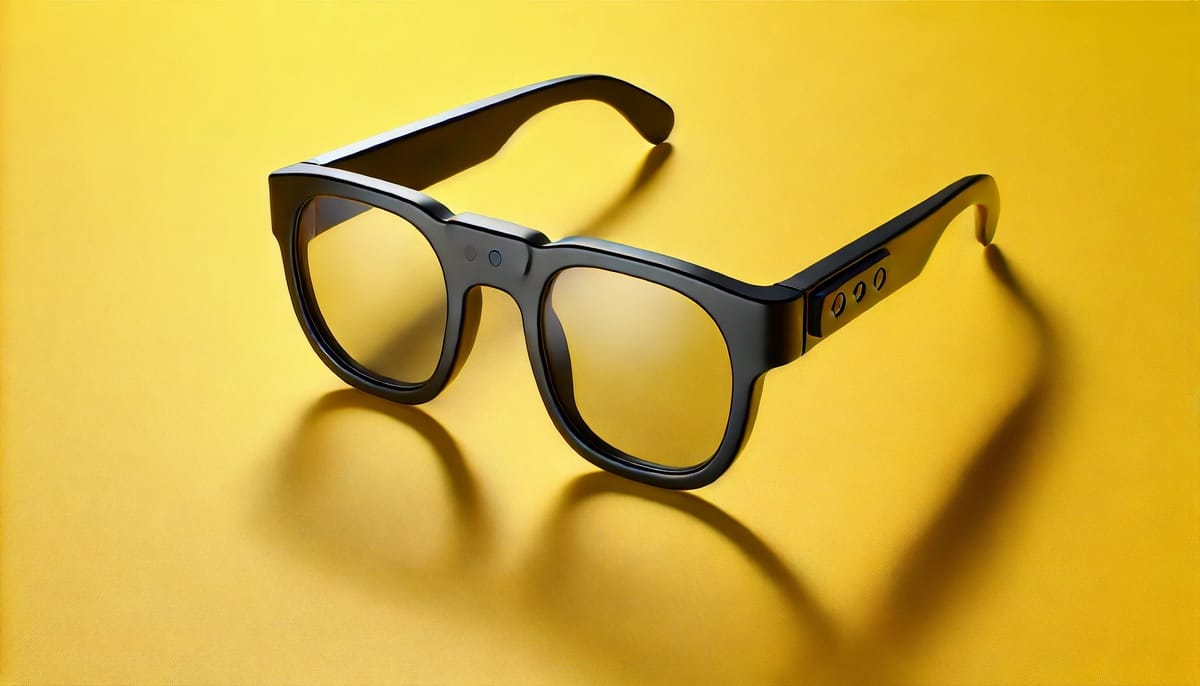Meta's Orion swagger
Meta held an event for a device that they’ll never ship. It was the right decision.

Last week, Meta held its annual Connect conference. It was at this event back in 2021 where Mark Zuckerberg, Meta’s CEO, enthusiastically announced that Facebook was to become Meta. So it feels appropriate that this year the event had essentially zero mention of any of its social apps.
It’s hard to imagine the company called Facebook having the posture that the company on stage had last week. As I argued a few weeks back, I think their rebrand has worked.
Meta Connect was confident, future-facing and – at moments – genuinely impressive. Unlike Apple or Google, who cycle through what feels like hundreds of lieutenants throughout their product events, Zuckerberg was pretty much the star of whole show. It was also an impressively live event: a welcome approach, I think, in a world where Apple now only ever shows pre-recorded videos to announce their products.
There’s something magical about seeing something demoed live. I think it’s the high stakes. The risk that something could go wrong.
Orion
The big news of the event was a product that you can’t buy. You’ll never be able to buy it. But everyone seems to be talking about it anyway.
From The Verge:
Meta has revealed its Orion augmented reality glasses, and they look almost like a trendy pair of frames you could pick up without all the tech inside. Orion uses Micro LED projectors inside the frame and beams images in front of your eyes via waveguides in the lenses. Orion has the same kinds of generative AI capabilities as the current Ray-Ban smart glasses — but adds a visual element to make it more helpful, like adding labels on top of ingredients you’re looking at on a table.
The glasses pair with a wireless compute puck and a “neural wristband” you wear on your arm that responds to gestures like punches. Orion isn’t quite ready as a product, though, so it isn’t going on sale.
I was blown away just watching Alex Heath try these glasses out. I don’t actually think these can pass as normal glasses, but they look pretty much close enough. This is so clearly the correct way to deliver augmented reality (or spatial computing as Apple calls it), that it makes the Vision Pro, a genuinely incredible product, look a bit silly.
Yet, there are big differences here. I will never be able to wear the Orion glasses. I actually bought the Vision Pro. One is a controlled demo, the other is a shipping product.
This debate has taken over my timeline over the last few days. It’s summed up pretty neatly by this, from Neil Cybart:

On one side, the Orion glasses are pure fiction. “Real artists ship” is the argument: you can’t judge technology until the general public can buy it.
On the other side, it’s a cause for great embarrassment for Apple. Yes, they shipped a product, but the thing they shipped looks lightyears behind these glasses.
I think this debate is largely besides the point. Obviously it’d be better if Meta was able to produce a device that we could all buy today. And obviously it’d be better if Apple’s Vision Pro was in a glasses form factor.
Here’s the thing, though. Zuckerberg wasn’t trying to sell you its hardware this year. This is a continuation of their long-term strategy, kickstarted in 2021. A perception transformation.
From the social apps company responsible for ruining democracy to the futuristic platforms company trailblazing the most exciting hardware and software technologies.
Meta’s shift
It’s quite incredible, really. Three years ago, Meta was a social apps business called Facebook. Yes – they did have more to them at that point. They had bought Oculus, a VR company, around the same time they bought WhatsApp. That acquisition had formed the foundations of their Reality Labs unit: a future-facing arm exploring new technologies. But the company still made most of its money from its advertising business.
Facebook was attracting worldwide attention. It was not positive. From the Cambridge Analytica scandal, to the Frances Haugen Facebook Files, to the devastating effects of their platforms on the Rohingya in Myanmar, the narrative was simple and straightforward: Facebook had become the embodiment of the negative effects of technology on our world.
Three years later, the picture is mixed. Facebook is now Meta, and it seems as though they’re taking safety more seriously. But the truth is, we care less about holding big technology companies to account. Over at Platformer, Casey Newton has reported time and time again on the decline of trust and moderation inside these companies as the political landscape has shifted outside of them.
But the bigger picture is this: Meta has relegated its cash-cow social platforms in its corporate comms incredibly successfully. The company has not meaningfully changed its revenue mix: it is still wildly reliant on its social platforms. We all claim to hate but them. But we’re collectively addicted to Instagram and Threads and Facebook. And we’re still driving record profits to the company as a result.
We don’t consider Meta to be the company it is anymore, somehow. It is still a social apps company with an incredibly expensive research and development programme. Some of their R&D projects have turned into actual products, like the Ray Ban Metas or Meta Quest. Others, like Orion or Navaré, have not. Nothing from this side of the business is making meaningful revenue.
Yet last week my social timelines (ironically, the social timelines that Meta itself creates and curates) were full of punditry claiming that Meta, née Facebook, a 20 year old company that excels in internet software, is way ahead of Apple, an almost 50-year-old business that has been making and shipping great hardware since the very beginning.
It’s remarkable. Meta is now a consumer technology company, even though it’s barely shipping any consumer technology products.
Perception and reality
I think this speaks to a wider theme where technology companies are using their enormous reach and bottomless pockets to become something they’re not. Recently, I wrote about how Apple’s messaging is off because it’s trying to tell the market it’s an AI company now. Meta is doing the same thing by pretending to be a hardware company and I think it might be working.
Meta and Apple are both so big that individual customer perception doesn’t matter materially to how they’re valued. They both have businesses that print money: Meta’s social apps are probably one of the world’s best ever businesses, eclipsed only by the device that enabled them in the first place: Apple’s iPhone.
Both businesses are so entrenched that consumers are very unlikely to stop buying iPhones and advertisers are not going to stop spending their marketing money on Meta’s platforms.
Yet, both Meta and Apple still have to demonstrate that they can grow. Being the biggest companies in the world isn’t enough.
And the only path to growth is by getting investors excited by the future and inflating their stock prices. Both companies need to signal that they’re not just their core businesses.
Apple has decided they have to show they’re leaders in AI, so they’re advertising capabilities for the iPhone that haven’t shipped yet.
And Meta’s desperate to shake off the social app reputation and look like a consumer technology leader.
The wild thing about all of this is that it’s working for Meta. The commentary around Meta this week has been overwhelmingly positive. Everyone seems to think they are genuinely ahead of the world’s most innovative consumer technology company.
Meta’s confidence, Apple’s nervousness
The central criticism levelled against Meta following Connect is that they’re not shipping the thing that got all the attention. And I agree with that criticism: Meta should not be perceived or valued as a hardware innovator unless it actually ship the product.
Yet, they have enough of a story to make it credible enough. The Ray Ban Meta smart glasses have been a moderate hit for them – they are widely available and people who try them seem to love them (I liked them, but not enough to keep them). Meta Quest is a shipping product. Their AI efforts are genuinely impressive.
The aggregate effect is that the Orion feels like it could be real, because they’ve shipped enough.
Critics of Meta will tell you this isn’t good enough. Meta’s glasses are impressive and Apple Vision Pro unwieldy in comparison, but you can go buy the Vision Pro. Meta’s glasses are an impressive demo, nothing more.
But I think Meta’s confidence and posture here are forcing Apple into competitive moves that seem really uncharacteristic. It’s why Apple are so desperate to show that they’re ahead in AI. Or at least keeping pace with Meta and OpenAI and Google (they’re not – all three have very impressive large language model capability). Their entire iPhone marketing strategy this year centres on Apple Intelligence, a feature that isn’t available yet.
A tale of two events
Both Apple and Meta held product events in September that I think reflect their relative positions in 2024.
As I wrote following Apple’s September event, it feels like Apple is nervous. They’re on the back foot and panicking about being behind. Even though the products they announced, and are shipping today, are great products. The problem is, they are today’s products, not tomorrow’s products.
Meta’s event was entirely different because it felt more futuristic. They’re not even planning to sell the Orion smart glasses. Zuckerberg had swagger and confidence. They’re commanding the conversation around AI and spatial computing. They’re behaving like the underdogs, ready to take on the giant.
Apple is clearly still the leader of the two. They have a strong and defensible business and are masters at actually shipping great products that billions of people love. But they’re not the underdog anymore. They feel like a behemoth in the way Microsoft felt like a behemoth back in the 90s. Apple was the underdog.
Meta now feels like that underdog. They have an infectious, ambitious confidence about the future that Apple only seems to have in self-defence.
I never thought I’d write this, but… could Meta actually be the new Apple?





